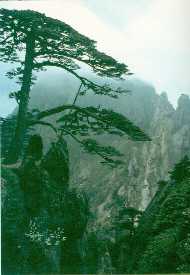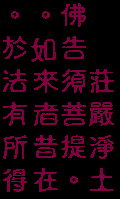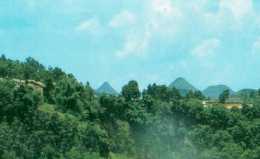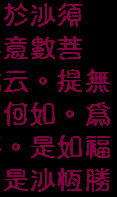CONTENTS
Commentary on Chapter 9 "The One Mark is no
Mark"
Subhuti said, "No, World Honored One. And why? A Srotaapanna means one who
has entered the flow, and yet he has not entered anything. He has not entered
forms, sounds, smells, tastes, tangible, objects, or dharmas. For that reason
he is called a Srotaapanna.
"Subhuti, what do you think? Can a Sakrdagamin have the thought, 'I have
obtained the fruit of Sakrdagamin.'?"
Subhuti said, "No, World Honored One. And why? A Sakradagamin means one who
returns once more, but he actually does not have a returning. For that
reason, he is called a Sakradagamin."
"Subhuti, what do you think? Can an Anagamin have the thought, 'I have
obtained the fruit of Anagamin'?"
Subhuti said, "No, World Honored One. And why? Anagamin means one who does
not return, but he actually does not have no returning. For that reason, he
is called Anagamin."
"Subhuti, what do you think? Can an Arhat have the thought, ' I have obtained
Arhatship.'?"
Subhuti said, "No World Honored One. And why? Actually there is no dharma
called an Arhat. World Honored One, if an Arhat had the thought, I have
attained Arhatship that would be attachment to self, to others, to living
beings, and to a life. World Honored One, the Buddha says that in my
attainment of the No Strife Samadhi I am the foremost among men, that I am the
foremost Arhat free from desire. World Honored One, I do not have the
thought, 'I am an Arhat free from desire.' If I had the thought 'I have
attained Arhatship', then the World Honored One could not say, 'Subhuti is the
foremost of those who delight in practicing Arana.' Since Subhuti actually
has no practice, he is called 'Subhuti, who delights in practicing Arana.'"
 "Subhuti, what do you think, can a Srotaapanna have the thought, 'I have
obtained the fruit of Srotaapanna.'?"
"Subhuti, what do you think, can a Srotaapanna have the thought, 'I have
obtained the fruit of Srotaapanna.'?"
The Assembly had heard that Buddhahood could not be sought, and that Dharma could not be grasped. There would be no abiding anywhere. The Buddha further revealed the real mark Prajna with respect to the different stages of fruition in the certification of spiritual life:
 It is stated in Chapter 7 that "Unconditioned Dharmas
distinguish worthy sages". It implies that all sages have gone
beyond the distinctions of conditioned life. However, those of the Hinayama
do not forget their traditional ideas in respect of names and terms, and still
cling to the existence of a real Dharma. Thus, they encountered difficulty in
understanding the real mark Prajna, and have many doubts in their minds.
Specifically, many Buddhist scriptures stipulate that the sages obtain a
distinctive fruit of their conduct, i.e. the Four Fruition, namely,
It is stated in Chapter 7 that "Unconditioned Dharmas
distinguish worthy sages". It implies that all sages have gone
beyond the distinctions of conditioned life. However, those of the Hinayama
do not forget their traditional ideas in respect of names and terms, and still
cling to the existence of a real Dharma. Thus, they encountered difficulty in
understanding the real mark Prajna, and have many doubts in their minds.
Specifically, many Buddhist scriptures stipulate that the sages obtain a
distinctive fruit of their conduct, i.e. the Four Fruition, namely,
How can this contradiction be resolved?
It states in Chapter 7 that "The Dharma spoken by Tathagata cannot be grasped and cannot be spoken. They are neither Dharma nor No-Dharma".
Similarly, none of the sages can grasp a fruit as his own. For the reality of nature, i.e. real mark Prajna, a sage should obtain the Unconditioned Dharma - no attachment to self and Dharma at all.
Srotaapanna means entering the stream, i.e. the stream of sages. Srotaapanna is turned by the Six Dusts. He can see form, but not be confused. He can perceive sounds, smells, tastes, tangible objects, and Dharmas, but not be attached to any of them. Therefore, as he is not attached, he is so called srotaapanna, which is merely a name, not an actual substance. In reality, there is actually nothing to enter, and nothing to be attached. Therefore a Srotaapanna cannot think or say that he has obtained the fruit of Srotaapanna.
 Sakrdagamin means returning once more, i.e. being born once in heavens
and once among men. Again, he actually does not have to return. He can end
birth and death suddenly. He has a choice: either to have one more birth and
death, or to progress further, certify to the third fruit (Anagamin) and not
return. Sakrdagamin is just a name, and has no actual substance. Therefore
he cannot be said to have attained anything.
Sakrdagamin means returning once more, i.e. being born once in heavens
and once among men. Again, he actually does not have to return. He can end
birth and death suddenly. He has a choice: either to have one more birth and
death, or to progress further, certify to the third fruit (Anagamin) and not
return. Sakrdagamin is just a name, and has no actual substance. Therefore
he cannot be said to have attained anything.
Anagamin means no returning, i.e. no more rebirth in the world of desires, because he has cut off all thought delusion within the desire realm, and no longer is compelled to be reborn in that realm. Actually, he also does not have no returning, if he does not become attached to the mark of no returning.
Arhat means not to be born. For an Arhat, there should be only the non-arising of a single thought in his mind. If an arhat thinks that he is an Arhat, he will not differ from any living beings holding and clinging to the Four Marks.
The key point is non-attachment to the Dharma mark of entering the flow, the mark of returning once, the mark of no returning, and also the mark of not to be born.
There is no tangible Dharma which can be called Arhatship. It is an empty name. If one thinks it exists, one has an attachment to Dharma, and has not realized the emptiness of Dharma. The thought of obtaining Arhatship carries with the mark of self, thus the marks of others, living beings and a life. One should not attach to the Four Marks. The real mark Prajna is no mark, neither be certified nor spoken. All Arhats should not attach to any Dharma that can be certified and spoken.
The Buddha says that Subhuti is the foremost Arhat apart from desire. Living beings are generally plagued to Five Desires, i.e. wealth, form, fame, food and sleep. Separating from desire, one obtains No-Strife Samadhi and becomes pure. That is meant by foremost free from desire.
Subhuti who practices Arana is nothing but a false name. As an Arana practitioner, Subhuti would like to cultivate pure conduct, yet obtain no thing.
Commentary on Chapter 10 "The Adornment of Pure
Lands"
"No, World Honored One, there was actually no dharma which the Tathagata
obtained while with Burning Lamp Buddha."
"Subhuti, what do you think, does a Bodhisattva adorn Buddhalands?"
"No, World Honored One. And why? The adornment of Buddhalands is no
adornment, therefore it is called adornment."
"Therefore, Subhuti, the Bodhisattva, Mahasattva, should thus produce a pure
heart. He should produce that heart without dwelling in forms. He should
produce that heart without dwelling in sounds, smells, tastes, tangible
objects, or dharmas. He should produce that heart without dwelling anywhere."
"Subhuti, suppose a person had a body like Sumeru, King of Mountains. What do
you think, would that body be big?"
Subhuti said, "Very big, World Honored One. And why? It is said by the
Buddha to be no body. Therefore it is called a big body."
 The Buddha said to Subhuti, "What do you think? Was there any dharma which
the Tathagata obtained while with Burning Lamp Buddha?"
The Buddha said to Subhuti, "What do you think? Was there any dharma which
the Tathagata obtained while with Burning Lamp Buddha?"
In this chapter, Shakyamuni Buddha used himself as an example to illustrate that a Buddha or Bodhisattva is not different from the sages of Arhatship, as far as the attachment of Dharma is concerned.
At a time, Shakyamuni Buddha received assurance from The Burning Lamp Buddha (i.e. Buddha Dipankara), that he was destined for Buddhahood named Shakyamuni. One may infer that Shakyamuni at that time obtained some Dharma from The Burning Lamp Buddha. However, the interference contradicts the teaching of Diamond Sutra that there is no such thing as a Dharma. Actually, Shakyamuni received no Dharma from The Burning Lamp Buddha in the beginning of his Buddhahood.
Moreover, in the course of Buddhahood, does a Bodhisattva use the merit and virtue of cultivating the Six Paramitas and the Ten Thousand Practices to adorn Buddhalands? The answer is again no! Actually, it refers to the Mahasattva, the eighth stage of Bodhisattva. Being the King of Dharma, the Bodhisattva can perfect the beings in a chosen part of the world, and gradually transform into a Pure Land by the adornment of his merit and virtues. Pure Land is developed by pure mind; pure mind is developed when it does not abide in anything.
 In Buddhism, material world is a reflex of Karma, and the spiritual maturity of beings
determines their living conditions. Therefore, the Buddhaland, i.e. the Pure
Land is created by the will power and the force of Bodhisattva's meritorious
Karma, offering ideal conditions for rapid spiritual progress. However, if a
Bodhisattva thinks or says "I adorn Buddhalands", he does not realize the emptiness of self and Dharma.
In Buddhism, material world is a reflex of Karma, and the spiritual maturity of beings
determines their living conditions. Therefore, the Buddhaland, i.e. the Pure
Land is created by the will power and the force of Bodhisattva's meritorious
Karma, offering ideal conditions for rapid spiritual progress. However, if a
Bodhisattva thinks or says "I adorn Buddhalands", he does not realize the emptiness of self and Dharma.
One should not attach to the mark of self, i.e. I, and not attach to the Dharma of Buddhalands. A Bodhisattva who adorns Buddhalands does not think that he is adorning Buddhalands. The adornment of Buddhalands is merely a name and nothing more. It has no real substance. Therefore, a Bodhisattva, Mahasattva, should produce pure heart.
A pure heart is free from attachment with no mark. He should produce that heart without dwelling in Six Dusts. The sentence that he should produce that heart without dwelling anywhere summarizes the entire meaning of Diamond Sutra. The famous Sixth Patriarch Hui Neng attained instantaneous enlightenment when he heard of this sentence.
The assembly perhaps would raise the following doubt: if there is no adornment of Buddha Lands, where would the Buddha's Retribution Body abide or dwell?
Shakyamuni Buddha cut off this doubt by declaring that the Dharma Body was not a body. His idea was that the land of no-land was permanently pure and illuminating and that the body of no-body was the Dharma Body. Both of them has no form. As the body could not be perceived by means of form, how then could the land be adorned?
It is said by the Buddha to be no body, a body without comparison, a body without measurement, thus it is truly big body. No matter how big the physical body is, it is finite and measurable. The No body of Buddha is his Dharma Body as the result of his teachings, his wisdom and his merits, which is, of course, infinite immeasurable and incomparable. The Dharma Body is the true Buddha, while the Reward Body and the Transformation Body are not.
Commentary on Chapter 11 "The Supremacy of
Unconditioned Blessings"
Subhuti said, "Very many, World Honored One. The Ganges Rivers alone would be
incalculable, how much the more so the grains of sand in them."
"Subhuti, I will now tell you the truth. If a good man, or good woman, used
the seven precious gems to fill three thousand great thousand world systems
equal in number to the grains of sand in all those Ganges Rivers, and gave
them as a gift, would he obtain many blessings?"
Subhuti said, "Very many, World Honored One."
The Buddha told Subhuti, "If a good man, or good woman were to receive and
hold from this Sutra even so few as four lines of verse and speak them for
others, his blessings and virtue would surpass the former's blessings and
virtue."
 "Subhuti, if there were as many Ganges Rivers as there are grains of sand in
the Ganges River, what do you think, would the grains of sand in all those
Ganges Rivers be many?"
"Subhuti, if there were as many Ganges Rivers as there are grains of sand in
the Ganges River, what do you think, would the grains of sand in all those
Ganges Rivers be many?"
In Buddhism merit and virtue always form the basis of the spiritual achievements. This chapter says that blessings and virtue without outflows surpass those with outflows, and that unconditioned blessings and virtue surpass the conditioned.
In the previous chapters, it was said that the Arhats, the Bodhisattvas, and the Buddhas must not grasp at marks, or have any attachment to self, to Dharmas, or to emptiness. They must be entirely without attachment. Having no attachment, they obtain the fruit of Buddhahood, the Bodhisattva's adornment of Buddhalands, or the certification to Arhatship.
Suspecting there would be people who would still attach to the mark of giving, the Buddha indicates that the blessings and virtue, derived from giving or offering any matter as precious as seven gems and in any quantity as many as the grains of sand in all Ganges Rivers, is conditioned and with outflow. Anything conditioned things eventually becomes extinct, and the presence of outflows keeps one bound to non-ultimate stages.
The Buddha then spoke of a man or woman, who receives and holds the Diamond Sutra, even so few as four lines of verse. To receive refers to acceptance in the heart and to hold refers to practice with the body. The four lines of verse represents the whole body of the Dharma Body, which is exactly the same as if the Buddha is present and as if the sages are expounding it.
Then, the blessings and virtue one obtains from speaking for others, even but four lines, are more than those obtained from the gift of as many as the seven precious gems filled in three thousand great thousand world systems. Why? The blessings and virtues derived from speaking the Buddha Dharma is unconditioned, undecaying, without outflow and devoid of a mark.






